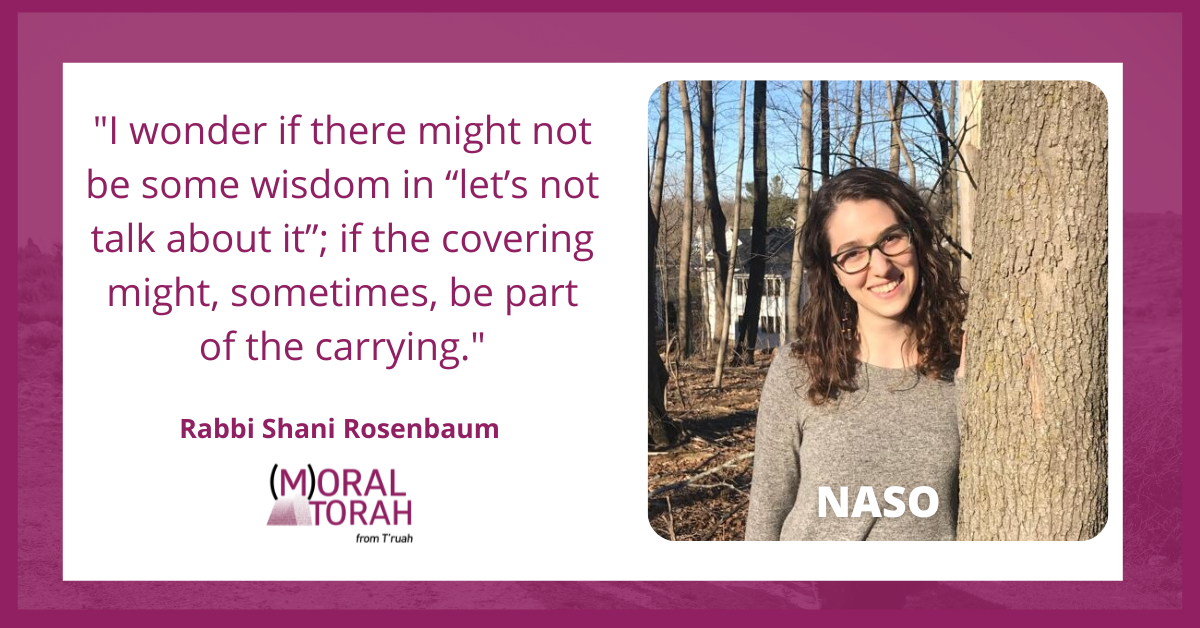A D’var Torah for Parshat Naso by Rabbi Shani Rosenbaum
Last week I paid a visit to my Bubbie, and she opened the door with heartbreak in her eyes. “I’ve been watching the news,” she said. We spoke for a few moments of the horrifying mass shooting in Texas, about each broken piece of our legal and political systems exposed, once again, in this tragedy’s wake. “Let’s not talk about it anymore,” my Bubbie finally said. With a twinge of guilt and a sigh of relief, I allowed my attention to turn with hers to the sweet mundane details of our lives, to Rummikub, to dinner.
Our parshah, Naso, begins with the distribution of burdens. The word “naso” is an instruction, in its context, to take a census of the Levite families tasked with various duties related to the Mishkan (Tabernacle). But the main meaning of its root, nasa, is to lift or carry. This root appears time and again in our parshah, as one particular task is associated with each clan: la’avod u’lemasa, to serve and to carry — to literally shoulder the burden of the Mishkan as the Israelites move through the wilderness.
A great deal of care is devoted to the particulars of avodat masa — the service of burden-bearing. Verses upon verses list the proper procedure for deconstructing each section of the Mishkan; carefully covering each piece of the inner structure; and dividing and carrying the load. What might we make of all this covering and carrying?
Sign up to receive (M)oral Torah in your inbox each week.
I have been thinking about that evening with my Bubbie, about the guilty relief I felt at the offering, “Let’s not talk about it.” The burden of all that is broken in our world often feels both impossible to bear, and, if we are honest, impossible to put down. We are gripped by either the pain of confronting a horrifying headline, or the guilt of setting it aside to watch trashy TV.
Some parts of the Mishkan, our parshah teaches, were so heavy that they required the help of wagons. But some parts were so precious that they could only be carried on human shoulders. What made it possible for the Levites to shoulder this sacred burden, without being overwhelmed by the task?
Break down.
Cover.
Carry.
Build.
Break down.
Cover.
Carry…
I wonder if there might not be some wisdom in “let’s not talk about it”; if the covering might, sometimes, be part of the carrying.
The Levites were not asked to confront the significance of what they bore on their shoulders in every moment of their journey; instead, the most sacred objects were presented to them sealed off in protective wrapping. Covering up the deconstructed Mishkan was not an act of avoidance, but an acknowledgement that there is a time for avodah — for service, and its attendant vulnerability; and a time for masa — for carrying — which necessitates a bit more removal. At the same time, the Levites knew that the carrying itself was temporary — and that building always followed.
Find more commentaries on Parshat Naso.
The pull to put down the broken pieces of our world is most powerful when we find ourselves wandering without rhythm; without a sense of when and where we will set our stakes in the ground. If I say “let’s not talk about it” with no plan for engagement — no date in my calendar for a protest, no op-ed drafted on my desk — then I may indeed be neglecting my avodat masa. But if I choose to play cards with Bubbie tonight, knowing that tomorrow I will spend a few minutes calling my senator, then I am simply tucking away the burden for now, protecting the fragments — and my own capacity to carry them — until the next opportunity for building.
What if we are not expected, in every moment, to be struggling to rebuild our disassembled world? What if a little bit of separation from the onslaught of suffering might re-sensitize us to its urgency, to life’s sanctity? Perhaps a framework of avodat masa can help us locate that fuzzy line between taking meaningful rest and simply avoiding responsibility.
 We might begin with community and accountability. Who are the high priests you find yourself looking toward for instruction and supervision? Who are the other burden-bearers who might urge you forward when you are weary?
We might begin with community and accountability. Who are the high priests you find yourself looking toward for instruction and supervision? Who are the other burden-bearers who might urge you forward when you are weary?
And then we could keep in view, if not an ultimate destination, at least the next encampment. What if we asked ourselves “If not now — when?” as a genuine, rather than rhetorical question? If we get in the habit of putting pursuit of justice on our schedules as we would any other important avodah, the daily weight of the world might begin to feel a bit lighter.
Rabbi Shani Rosenbaum teaches Talmud and Halakha at the Rabbinical School of Hebrew College. She has served on the programming teams of OLAM and Encounter, and ran T’ruah’s 2020 “Jewish law and ethics hackathon” for navigating COVID-19.

